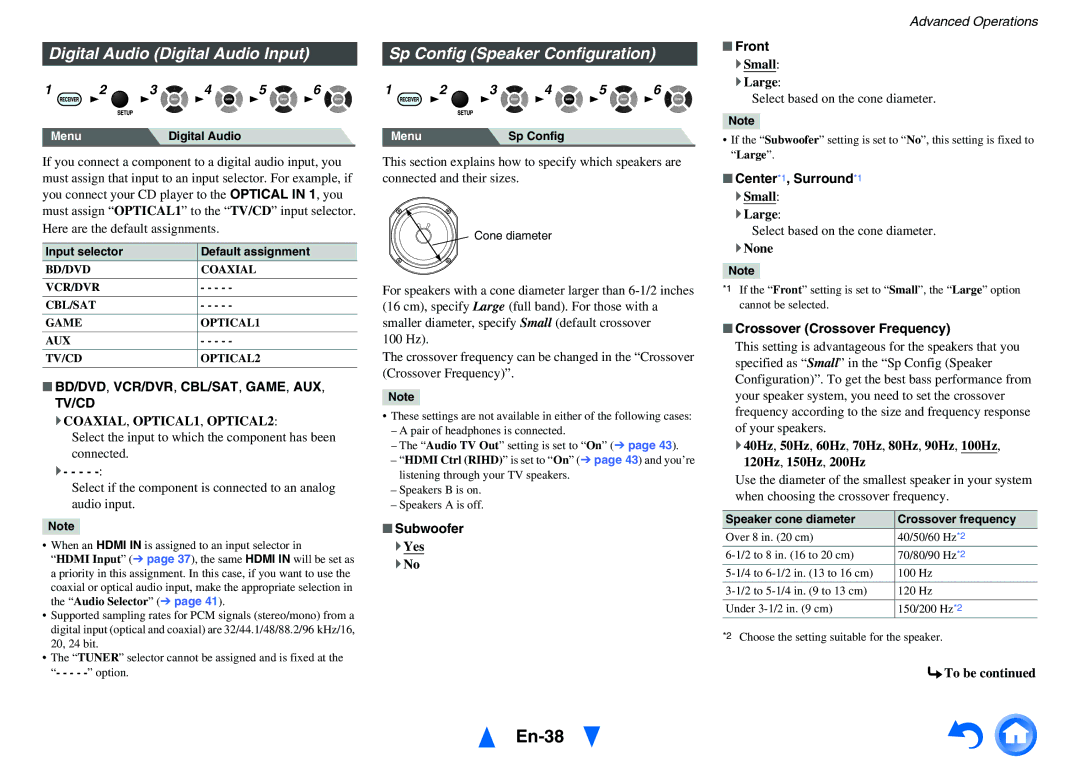
Digital Audio (Digital Audio Input) |
|
| Sp Config (Speaker Configuration) | |||||||||
1 | 2 | 3 | 4 | 5 | 6 | 1 | 2 | 3 | 4 | 5 | 6 | |
Advanced Operations
■Front
`Small:
`Large:
Select based on the cone diameter.
Note
Menu | Digital Audio |
If you connect a component to a digital audio input, you must assign that input to an input selector. For example, if you connect your CD player to the OPTICAL IN 1, you must assign “OPTICAL1” to the “TV/CD” input selector. Here are the default assignments.
Input selector | Default assignment |
BD/DVD | COAXIAL |
|
|
VCR/DVR | - - - - - |
|
|
CBL/SAT | - - - - - |
|
|
GAME | OPTICAL1 |
|
|
AUX | - - - - - |
|
|
TV/CD | OPTICAL2 |
|
|
■BD/DVD, VCR/DVR, CBL/SAT, GAME, AUX,
TV/CD
`COAXIAL, OPTICAL1, OPTICAL2:
Select the input to which the component has been connected.
`- - - -
Select if the component is connected to an analog audio input.
Note
•When an HDMI IN is assigned to an input selector in
“HDMI Input” (➔ page 37), the same HDMI IN will be set as a priority in this assignment. In this case, if you want to use the coaxial or optical audio input, make the appropriate selection in the “Audio Selector” (➔ page 41).
•Supported sampling rates for PCM signals (stereo/mono) from a digital input (optical and coaxial) are 32/44.1/48/88.2/96 kHz/16, 20, 24 bit.
•The “TUNER” selector cannot be assigned and is fixed at the “- - - -
Menu | Sp Config |
This section explains how to specify which speakers are connected and their sizes.
Cone diameter
For speakers with a cone diameter larger than
100 Hz).
The crossover frequency can be changed in the “Crossover (Crossover Frequency)”.
Note
•These settings are not available in either of the following cases:
–A pair of headphones is connected.
–The “Audio TV Out” setting is set to “On” (➔ page 43).
–“HDMI Ctrl (RIHD)” is set to “On” (➔ page 43) and you’re listening through your TV speakers.
–Speakers B is on.
–Speakers A is off.
■Subwoofer
`Yes
`No
•If the “Subwoofer” setting is set to “No”, this setting is fixed to “Large”.
■Center*1, Surround*1
`Small:
`Large:
Select based on the cone diameter.
`None
Note
*1 If the “Front” setting is set to “Small”, the “Large” option cannot be selected.
■Crossover (Crossover Frequency)
This setting is advantageous for the speakers that you specified as “Small” in the “Sp Config (Speaker Configuration)”. To get the best bass performance from your speaker system, you need to set the crossover frequency according to the size and frequency response of your speakers.
`40Hz, 50Hz, 60Hz, 70Hz, 80Hz, 90Hz, 100Hz, 120Hz, 150Hz, 200Hz
Use the diameter of the smallest speaker in your system when choosing the crossover frequency.
Speaker cone diameter | Crossover frequency |
Over 8 in. (20 cm) | 40/50/60 Hz*2 |
70/80/90 Hz*2 | |
100 Hz | |
|
|
120 Hz | |
|
|
Under | 150/200 Hz*2 |
*2 Choose the setting suitable for the speaker.
![]() To be continued
To be continued
